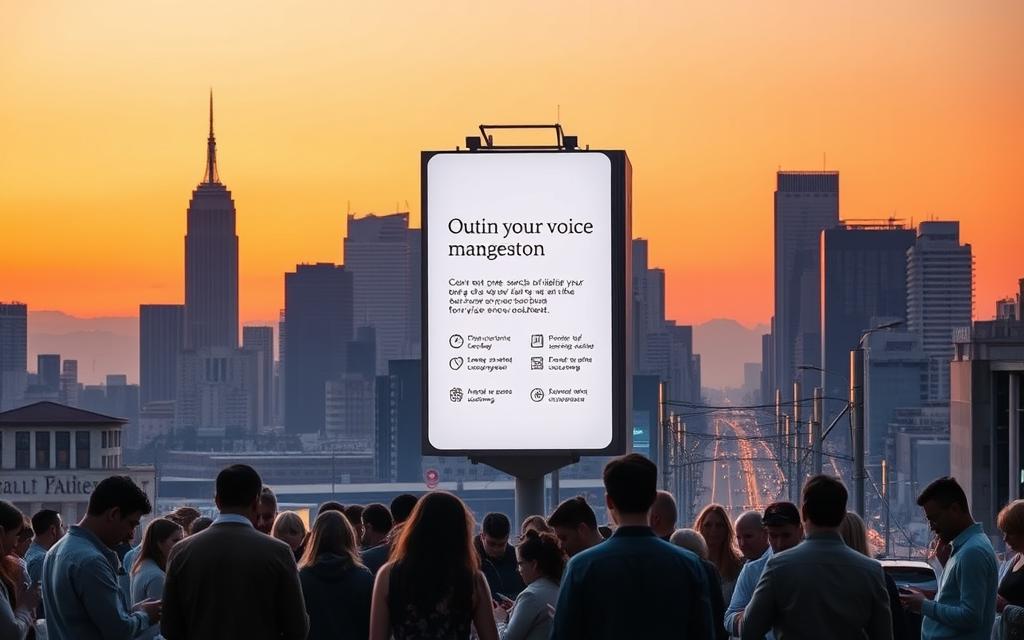How To Get My Business on Voice Search
Are you ready to take your business to the next level with voice search optimization? Voice assistants like Siri, Google, and Alexa are getting more popular. Robin Samora says voice search is already 20% of all searches and will grow a lot more.
But are you ready to change your voice search strategy for your customers? As voice search grows, businesses that don’t adapt will fall behind. By learning how to optimize for voice search, you can get more seen, get more leads, and beat your rivals with voice search optimization.
Voice Search for Business Steps
- Understand the importance of voice search for your business
- Learn how to optimize your online presence for voice search
- Discover strategies to improve your visibility and drive more leads
- Stay ahead of the competition with a effective voice search strategy
- Adapt to the changing needs of your customers with voice search optimization
Understanding Voice Search and Its Importance
Voice technology is getting better fast. It’s key for businesses to keep up. Voice search changes how we use tech, affecting businesses a lot.
What is Voice Search?
Voice search lets users find info online by talking. It uses helpers like Siri and Google Assistant. These tools understand what we say.
Voice search is getting more popular. People like talking to find info instead of typing. This is because of smartphones and smart speakers.
Why Does Voice Search Matter for Businesses?
Voice search changes how we find things online. It uses natural talk, so businesses need to adjust their SEO. This means making their sites better for voice search.
Optimizing for voice search is key for businesses. They need to know how to answer voice queries. This way, they can show up in voice search results.
| Benefits of Voice Search Optimization | Description |
|---|---|
| Increased Visibility | Optimizing for voice search can help businesses appear in more search results. |
| Improved User Experience | Voice search provides users with a more natural and convenient way to find information. |
| Competitive Advantage | Businesses that optimize for voice search can gain a competitive edge over those that don’t. |
The Growth of Voice-Activated Devices
More people are using voice-activated devices. Smart speakers are getting popular in homes in the U.S. This makes voice search more common.
Voice tech is getting better, leading to new uses for voice search. Businesses that get voice search will do well.
How Voice Search Works for Users
How Voice Search Works for Users
The rise of voice search has changed how we use search engines and websites. It’s key to know how this technology works and how it impacts your online image.
The Technology Behind Voice Assistants
Voice assistants like Siri, Google Assistant, and Alexa use special tech to understand voice commands. The main tech is natural language processing (NLP), which lets them get what you’re asking.
Here are the main parts of voice assistants:
- Speech recognition: This lets them turn spoken words into text.
- Natural Language Processing (NLP): This tech helps them grasp what you mean.
- Knowledge graphs: Huge databases with lots of info on different topics.
Natural Language Processing and Voice Queries
NLP is key for voice search. It lets voice assistants get the meaning of what you say.NLP algorithms look at the words, meaning, and context to give you good answers.
How Users Phrase Questions
When using voice search, people ask questions in a different way than typing. Voice queries are longer and more like talking. For example, “What’s the best Italian restaurant near me?” instead of “best Italian restaurants nearby.”
To do well in voice search, businesses should:
- Use long-tail keywords that sound like how we talk.
- Focus on questions that people might ask with voice search.
- Make sure your content is short, clear, and answers questions directly.
Optimizing Your Website for Voice Search
With more people using voice-activated devices, making your website voice-search friendly is key. You’ll need to focus on several important areas to do this.
On-Page SEO Strategies for Voice Search
To get your website ready for voice search, start with on-page SEO. Use conversational keywords that sound like how we talk. Also, aim to answer common questions about your business or industry.
- Use long-tail keywords that sound like natural speech.
- Make your content answer questions directly.
- Make sure your content is both informative and fun to read.
Utilizing Structured Data Markup
Structured data markup helps search engines understand your site better. Adding schema markup can boost your chances of showing up in voice search results.
For example, if you have a business listing, schema markup can highlight your business’s name, address, and hours. This helps voice assistants give users the right info.
Importance of Fast Loading Times
Fast loading times are important for both regular and voice search. A slow site can hurt your rankings and user experience.
Here are some ways to speed up your site:
- Optimize images to make them smaller.
- Minify CSS, JavaScript, and HTML files.
- Use browser caching for quick access to resources.
By using these tips, you can make your site more visible in voice search. This will help bring in more visitors and keep you ahead in the online world.
Crafting Content for Voice Searches
Creating content that answers what users ask their voice assistants is key. This helps you show up more in voice search results. As voice search grows, businesses must change their content plans to meet user needs.
Conversational Keywords
To make your content better for voice search, use conversational keywords. These should sound like how we talk. Voice searches are often longer and more natural than typed ones. So, using long-tail keywords can help you rank better.
- Use phrases that people would use in a conversation.
- Incorporate questions and answers within your content.
- Optimize for natural language processing by using everyday language.
Local SEO
Local SEO is very important for voice search. Many voice queries are about a specific location. Make sure your business is listed right in local directories and on Google My Business. This can really help you show up more.
| Local SEO Factor | Importance | Action |
|---|---|---|
| Google My Business Listing | High | Claim and optimize your listing. |
| Local Directory Listings | Medium | Ensure consistency across directories. |
| Location-Based Keywords | High | Incorporate location-based keywords in your content. |
Creating FAQ Pages
Make FAQ pages that answer common questions. This can help you rank for voice searches. By getting ahead of user questions, you make your content more relevant and trusted.

By using conversational keywords, local SEO, and FAQ pages, you can make a strong content plan. This plan will help you show up more in voice search results.
How to Leverage Local SEO for Voice Search
For businesses wanting to do well in the voice search world, a good local SEO plan is key. Voice search is getting more popular for finding local businesses. So, it’s very important for companies to make their online presence better for local searches.
Google My Business and Voice Search
Getting and improving your Google My Business listing is a big step in local SEO for voice search. Make sure your business’s name, address, and phone number (NAP) are the same everywhere online. Also, make sure your Google My Business profile is full, with the latest hours, categories, and a detailed description.
Voice assistants often get info from Google My Business listings. So, having a correct and full profile can really help you show up in voice search results.
Local Listings and Reviews Impact
Being in local directories and having good reviews are key for local SEO. Put your business in trusted local citations to get seen more online. Also, ask happy customers to leave reviews on your Google My Business listing and other places.
| Local Listing Platform | Importance for Voice Search |
|---|---|
| Google My Business | High |
| Yelp | Medium |
| Bing Places | Medium |
Utilizing Location-Based Keywords
Adding location-based keywords to your website’s content can boost your local search rankings. Use keywords that fit your business and location in your page titles, meta descriptions, headings, and content. This helps voice search algorithms see how your business fits local searches.
- Find your target location and the right keywords.
- Put these keywords naturally into your website content.
- Make your meta tags and headings better with location-based keywords.
By using these local SEO tips, you can get more seen in voice search results. This can bring more local visitors to your website. And, it can help you get more customers.
The Importance of Mobile Optimization
Mobile optimization is key for voice search success. More people use voice search on phones. So, making your website mobile-friendly is very important.
Mobile Usability and Voice Searches
A website that works well on phones is vital. It should be easy to use, load fast, and work on all devices. Make sure your content is easy to read on small screens.
Key aspects of mobile usability include:
- Easy navigation
- Fast loading speeds
- Clear and concise content
- Responsive design
Responsive Design Principles
Responsive design makes your website fit all screen sizes. It uses flexible grids and media queries for a great user experience.
A good responsive website:
- Changes layout for different screens
- Makes content easy to read
- Works the same on all devices

Increasing Site Speed for Mobile Users
Site speed is very important for mobile users. Slow sites scare people away and hurt your rankings. To speed up your site:
- Optimize images and compress files
- Minimize HTTP requests and use browser caching
- Use a content delivery network (CDN) to cut latency
| Optimization Technique | Description | Benefit |
|---|---|---|
| Image Compression | Reduces image file size | Makes pages load faster |
| Browser Caching | Saves often-used resources locally | Reduces HTTP requests |
| Content Delivery Network (CDN) | Distributes content across servers | Reduces latency and speeds up content delivery |
By focusing on mobile usability, responsive design, and site speed, you can improve your website’s voice search performance. This makes your site better for users and helps your voice search strategy.
Engaging with Voice Search Technology
It’s key for businesses to use voice search well. This makes things easier for users. As more people use voice search, companies need to keep up.
One good way is to add voice search apps to what they already do. They can make their websites and content easier to find with voice. This lets customers find and talk to their brand easily.
Integrating Voice Search Applications
Adding voice search apps can make customers happier and more loyal. It lets them do things like buy stuff or book appointments with just their voice. This makes things more personal and easy for them.
It’s great for businesses that are online a lot. It lets them reach more people and make things easier for them.
Exploring Voice Commerce Trends
Voice commerce is big now, thanks to smart speakers and virtual assistants. It lets people buy things and do things with just their voice. This is good for businesses that sell things online.
To get in on this, businesses should make their online stores easy to find with voice. This makes it simple for customers to find what they need.
Benefits of Voice User Interfaces (VUIs)
VUIs are good for businesses in many ways. They make things easier for customers, more accessible, and better for everyone. They let people use their voices instead of hands or eyes.
This makes customers happier and more likely to come back. It also helps businesses stand out and lead in their field.
By using voice search and adding voice apps, businesses can lead the way. They need to keep up with new voice search trends and tech.
How to Make Your Business Stand Out in Voice Search
As voice search grows, businesses must adapt. People now use voice-activated devices to search. To be seen in voice search, you need smart strategies.

Crafting Unique Selling Propositions (USPs)
A good USP is key to standing out. It shows what makes your business special. Focus on what makes you different and show it online.
Think about what your customers want. Know what makes your business special. Then, show these things in your marketing.
Standout Voice Search Advertising Strategies
To shine in voice search, use smart ads. Voice search advertising reaches users through voice devices. Use ads that match voice search queries to get noticed.
Use voice search ad platforms to reach your audience better. Make sure your ads sound natural and use conversational keywords.
Creating Engaging Voice Content
Good voice content grabs attention. Make it conversational, useful, and relevant. Use a natural tone and add value.
Make content for common questions or problems in your field. This boosts your voice search visibility and makes you a trusted source.
Monitoring Your Voice Search Performance
It’s important to know how your business does in voice search. Voice search is changing fast. You need to keep up to meet your audience’s needs.
Tools for Analyzing Voice Search Traffic
To check your voice search performance, you need the right tools. Here are some good ones:
- Google Analytics: This tool tracks voice search traffic by looking at queries and user actions.
- Google Search Console: It shows how your site looks in search results, including voice searches.
- Third-party SEO tools: Tools like SEMrush or Ahrefs give detailed voice search analytics. They help find ways to get better.
Identifying Key Performance Indicators (KPIs)
To measure your voice search well, pick the right KPIs. Some important ones are:
- Voice search traffic volume: How many visitors come to your site from voice searches.
- Conversion rates: The percentage of voice search visitors who do what you want them to.
- Average position in voice search results: Your site’s average ranking for voice search queries.
Strategies for Ongoing Improvement
After tracking your voice search, it’s time to get better. Here are ways to do that:
- Optimize for natural language: Use words and phrases that sound like how people talk.
- Improve your local SEO: Many voice searches are about location. Make sure your local listings are right and current.
- Enhance your site’s user experience: Fast loading, mobile-friendly, and easy to navigate help with voice search.
By watching your voice search and using these tips, you can beat the competition. And give your users a better experience.
The Future of Voice Search for Businesses
Businesses need to get ready for the future of voice search. More people are using voice search to find what they need. This makes voice search marketing very important.
New Developments in Voice Technology
New voice tech includes artificial intelligence and machine learning. These help voice assistants get better. This change will affect how businesses use voice search.
Voice Search Growth Projections
More people will use voice search in the future. They will look for local businesses and services. It’s key for businesses to be on voice-enabled devices.
Staying Ahead in Voice Search
To lead in voice search, businesses should make conversational content. They should also focus on local SEO and use the latest voice tech. This way, they can stand out and be seen more online.



